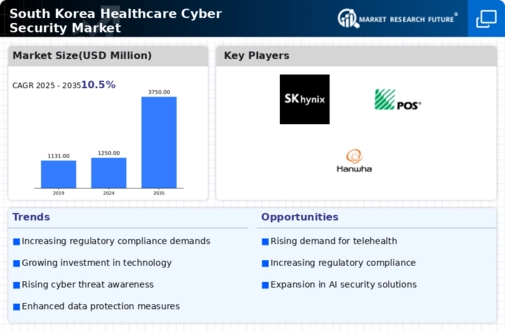Rising Cyber Threats
The healthcare cyber-security market is experiencing heightened demand due to the increasing frequency and sophistication of cyber threats. In South Korea, healthcare organizations are prime targets for cybercriminals, as they hold sensitive patient data. Reports indicate that the number of cyber incidents in the healthcare sector has surged by over 30% in recent years. This alarming trend compels healthcare providers to invest in robust cyber-security measures to protect their systems and patient information. The potential financial repercussions of data breaches, which can reach millions of dollars, further underscore the necessity for enhanced security protocols. As a result, the healthcare cyber-security market is likely to expand significantly as organizations prioritize safeguarding their digital assets against evolving threats.
Integration of IoT Devices
The proliferation of Internet of Things (IoT) devices in healthcare settings is significantly impacting the healthcare cyber-security market. In South Korea, the adoption of connected medical devices, such as wearables and remote monitoring systems, is on the rise. While these technologies offer numerous benefits, they also introduce new vulnerabilities that cybercriminals can exploit. The healthcare cyber-security market must address these challenges by developing solutions that secure IoT devices and the data they transmit. As organizations seek to leverage the advantages of IoT while mitigating risks, investments in cyber-security solutions tailored for these devices are expected to increase, further propelling market growth.
Government Initiatives and Support
The South Korean government is actively promoting initiatives aimed at strengthening the healthcare cyber-security market. With the increasing recognition of cyber threats, government agencies are implementing policies and frameworks to enhance the security posture of healthcare organizations. For instance, the Ministry of Health and Welfare has introduced guidelines that encourage healthcare providers to adopt advanced security measures. Additionally, funding programs are being established to support the implementation of cyber-security technologies. These government efforts are expected to drive growth in the healthcare cyber-security market, as compliance with regulations and standards becomes essential for healthcare organizations seeking to protect their operations and patient data.
Growing Patient Data Privacy Concerns
As awareness of data privacy issues escalates among patients, the healthcare cyber-security market is witnessing a surge in demand for solutions that ensure the protection of personal health information. In South Korea, patients are increasingly concerned about how their data is collected, stored, and used by healthcare providers. This growing concern has prompted healthcare organizations to prioritize the implementation of stringent cyber-security measures. According to recent surveys, over 70% of patients express a desire for greater transparency regarding their data security practices. Consequently, healthcare providers are compelled to invest in advanced cyber-security solutions to build trust and maintain patient confidence, thereby driving growth in the healthcare cyber-security market.
Increased Focus on Telehealth Services
The expansion of telehealth services in South Korea is reshaping the healthcare cyber-security market. As more healthcare providers offer remote consultations and digital health services, the need for secure communication channels and data protection becomes paramount. Patients and providers alike require assurance that their interactions are safeguarded against unauthorized access. The healthcare cyber-security market is responding to this demand by offering solutions that ensure the confidentiality and integrity of telehealth platforms. With the telehealth market projected to grow by over 25% in the coming years, the corresponding need for robust cyber-security measures is likely to drive significant investments in this sector.
















